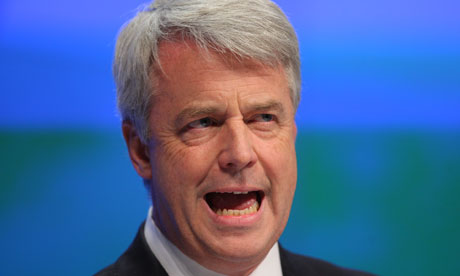
Andrew Lansley's announcement of a push to get the nation to cut 5bn calories a day from its diet was immediately slammed by health experts on Thursday, and branded "worthless, regurgitated, patronising rubbish" by Jamie Oliver.
Faced with a mounting obesity crisis that a succession of government initiatives on exercise have failed to turn around, the health secretary and the chief medical officer, Sally Davies, issued a "call to action" on diet, pointing out that alcohol contributed 10% to our calorie intake.
Lansley urged individuals to eat less and eat more wisely, and promised to talk to the food industry about voluntary cuts in the calorie content of processed food and drinks.
But the new plan, which Lansley termed a "national ambition" rather than a strategy, drew immediate derision from food campaigners and doctors. "Simply telling people what they already know – that they need to eat less and move more – is a complete cop-out," said Oliver.
The TV chef and food campaigner added: "This whole strategy is just worthless, regurgitated, patronising rubbish.
"Any of us could walk into any primary school in the country and find plenty of eight-year-olds with more creative solutions to these problems. It's a farce." He called for the government to make real change and then legislate and finance it.
As part of Lansley's much-criticised "responsibility deal" with food and beverage companies, the health secretary said he would now be asking the industry to voluntarily reduce the calories in their products. A 3-5% reduction in the calorie content in an average shopping basket would cut obesity without the consumer even noticing any change in the food they ate, Lansley claimed.
"We have already seen how we can move further, faster through the responsibility deal and I am now challenging business to help us make even greater progress," he said. "Reducing the number of calories we consume is essential."
He said 5bn calories was the equivalent of 16.9m cheeseburgers, which would cover about 20 football pitches, or 28.4m caffe lattes, enough to fill four Olympic swimming pools.
About 60% of UK adults and a third of children are overweight or obese. Strokes and heart problems are rising, diabetes is rocketing and overweight people run increased risks of cancers and infertility.
Terence Stephenson, president of the Royal College of Paediatrics and Child Health, said the 5bn calorie target "may grab headlines but is actually peanuts – 16 dry-roasted peanuts per person, per day, to be precise". He said: "The plan has no clear measures on how the food and drink industry will be made to be more responsible in their aggressive marketing of unhealthy food."
Unchecked, obesity could be costing the NHS £10bn a year by 2050, said Stephenson, adding: "Suggesting that children in particular can be 'nudged' into making healthy choices, especially when faced with a food landscape which is persuading them to do the precise opposite, suggests this would be best described as a call to inaction."
Which? executive director Richard Lloyd said the government's approach to tackling obesity was woefully inadequate. "The government calls on people to cut down the calories they eat, but isn't giving them the tools to do so," he said. "It must make sure front-of-pack traffic light labelling is used on all food products and clear calorie labelling is provided in all food chains.
"Food and drink manufacturers must cut fat and sugar, and therefore calories, from their products where possible and promote healthier options. But expecting them to do this voluntarily through a vague call to action is naive. We need a proper strategy which includes ambitious targets."
Lansley said his "national ambition", which he compared to Michelle Obama's campaign in the US, could reverse the upward trend by 2020.
He said he planned to invest in the anti-obesity campaign, Change 4 Life, but its annual budget has been cut from £25m to £14m in 2011-12.
On average, a man should not eat more than 2,605 calories and a woman 2,079 calories a day, according to new guidance from the scientific advisory committee on nutrition, released with Lansley's plan. This is a slight increase from the previous guidance – up by about 100 calories – as a result of better data.
Davies said that, on average, people were consuming 10% more calories than they should to remain at a stable healthy weight and that people did not tell the truth about their eating habits. "We need to start being honest with ourselves about what we eat and drink," she said.

